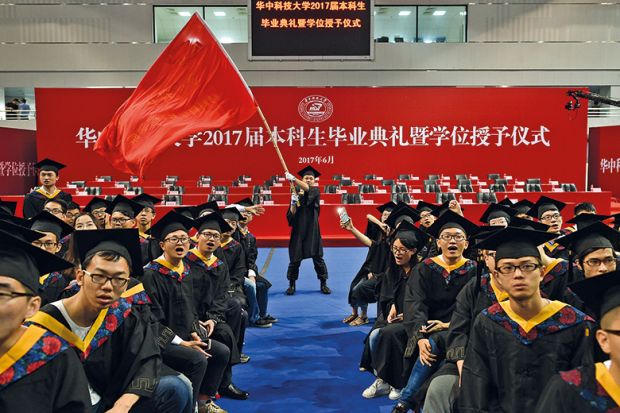My word. Things in the world of UK higher education really do look rather tricky. There's so much going on: the Office for Students launch; Brexit worries about residency status and research partnerships; immigration targets; fees and funding to name just a few of the top issues.
Next month, at the Asia Universities Summit, I will be giving my take on the future of the "international" part of the university business. If you know me, then you will not be surprised to learn I think we really must start with China.
I began my academic career as the UK joined the European Union, and I will retire as we leave this political and economic partnership that has shaped our century in so many ways. To say that I have been dismayed by the way Brexit is threatening so many things that are precious to UK universities is an understatement.
But to really understand our future, I think we must also look East. For there are other great nations in the world beyond Europe – although none quite like China. China, for example, now makes 40 per cent of all the world’s stuff, and buys 50 per cent of all the world’s luxury goods. And, it is still growing – at about 6 per cent a year!
If you think of higher education as a global luxury good (as I have heard it described), then you can easily grasp why Chinese families buy a big chunk of the very finest higher education "product": degrees from UK institutions. And let’s be honest, that demand has been the salvation of many UK universities' financial bottom lines.
But when you look at the better and fancier options now coming out of China – in everything from next-generation transport to technology – you will see that there are fewer and fewer things the country cannot make. This should make us all tremble.
It tells us that our higher education brands will have more and more competition in the years ahead, as China itself sets targets to become a destination for students from across the Belt and Road and beyond.
The UK might have Harry Potter, Downton Abbey and Sherlock on our side, but as public investment in research and teaching falls while China's rises, our edge can’t last for ever. China, for the record, is now the fourth most popular destination for students studying overseas.
So what should we be doing? In short, we should be getting real.
We have benefited from an extraordinary rise in Chinese wealth – money that came from a burgeoning market economy with Chinese characteristics. Wealth that was hard earned and saved by Chinese parents to pay for the very best education, a Western education, for their children.
There has never been such a tidal wave of affluence produced in the history of the world. And we have seen the benefits as millions of smart young Chinese travelled the world to study with us in the UK.
They came to get the finest of educations. To learn English. To make international friends. Some of them worked in the West to pay off the cost of their education. Some wanted to stay after graduation to benefit from the finest research facilities, for the chance to be a teacher in our universities, and for the opportunities offered by a Western career and lifestyle.
Some of these graduates will have worked in high technology companies, some will even have started them and created jobs. We know and admire these young people. But that is all changing, so let’s look at what has been going on.
Anyone who has an outdated view about substandard Chinese research simply hasn’t been paying attention. China will soon pass the US in science output. Donald Trump will help that happen faster.
Chinese science and technology infrastructure will soon be as good as or superior in many respects to what we find in the West. Investment in key new technologies is staggering and long term. The environment for starting new enterprises in places such as Shenzhen and Shanghai is simply superb.
Leading Chinese academics who once worked abroad are now returning to this transformed and well-funded world of academia. I have recently had meetings with the leaders of the top Chinese universities, national research institutes and leading business organisations. In every case I have met experienced and purposeful academics who have spent years working in top institutions in the US.
They know what needs to be done to help China achieve its aims. I have seen a new empire rising, and our preoccupation with the US and Europe is not slowing the way. Asia is rising as a great force in science and innovation with an infrastructure that will soon make high speed links from Kunming in China through Malaysia to Singapore.
As for the Chinese students and academics we have come to know as part of our own universities, will they continue to look West? I hope so, but we should take nothing for granted.
So what should we do in the years ahead?
We’ll have to keep explaining to our own citizens the true benefits of international students to the UK. We have done a decent job to date but we have to carry on. We desperately need the right visa conditions, including post-study work, in order to keep competing globally.
We have, in particular, to explain the cross-subsidy and the shortfall in funding that will happen if and when international student numbers go down. We know this is likely to make it much more difficult to keep our international reputation in research. British universities are not great simply because they are British. They need talent, money, partnerships and mobility.
A quick look at the history of the world shows us that the homes of culture, trade, science and intellectual life can move.
As someone who has worked with and taught scholars and students from around the world, I do know that internationalism goes to the core of our identities as universities. I also know we shall all continue to make sure our universities provide the very best education for our Chinese students, and all those others who board planes for a new life and the opportunity that goes with it.
We’ll provide the very best facilities and conditions for our all our international students. We shall honour the sacrifice their families have often made to fund their children’s education. And we shall work with Chinese science and technology colleagues to build a better future world.
There may be trouble ahead. The way to face it is not to turn inwards and to lose ourselves in the chatter of local politics. Our task is to prepare our students and to undertake research that seeks common understanding, creates opportunity and finds solutions to problems that do not end at national boundaries.
I truly hope that, together, we will succeed.
Sir Keith Burnett is president and vice-chancellor of the University of Sheffield, and will be a speaker at the Times Higher Education Asian Universities Summit in Shenzhen, China in February. Book your place now.
Register to continue
Why register?
- Registration is free and only takes a moment
- Once registered, you can read 3 articles a month
- Sign up for our newsletter
Subscribe
Or subscribe for unlimited access to:
- Unlimited access to news, views, insights & reviews
- Digital editions
- Digital access to THE’s university and college rankings analysis
Already registered or a current subscriber?









